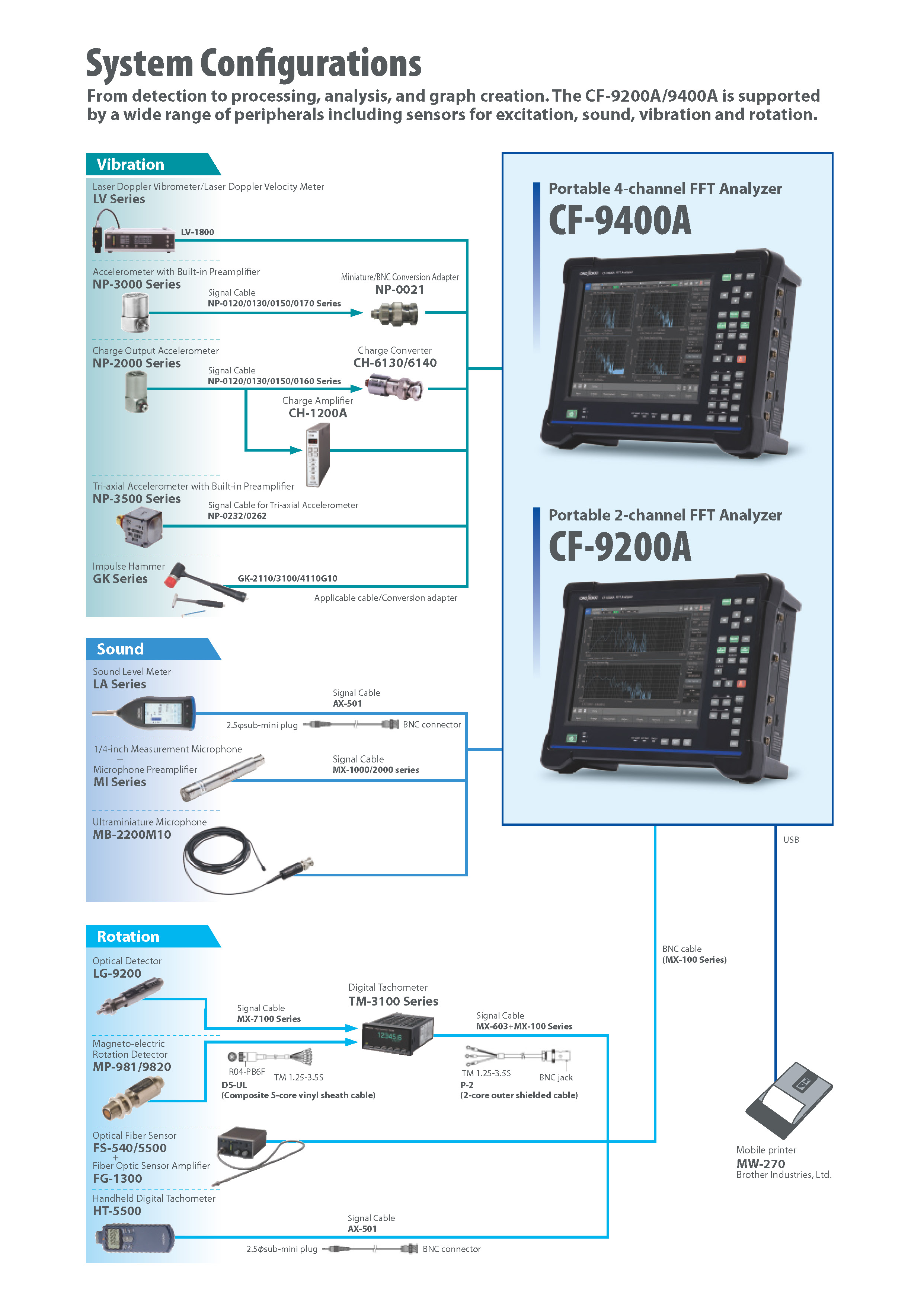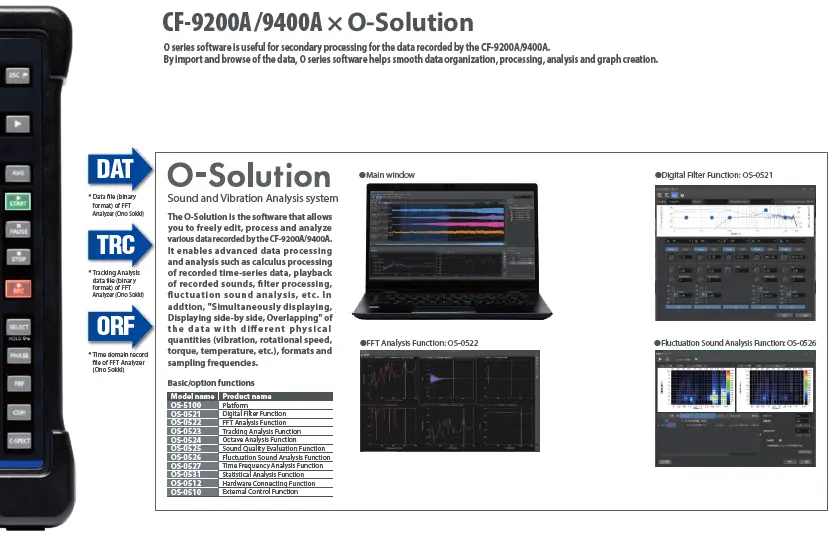Portable 2 channel/4 channel
FFT Analyzer CF-9200A/CF-9400A
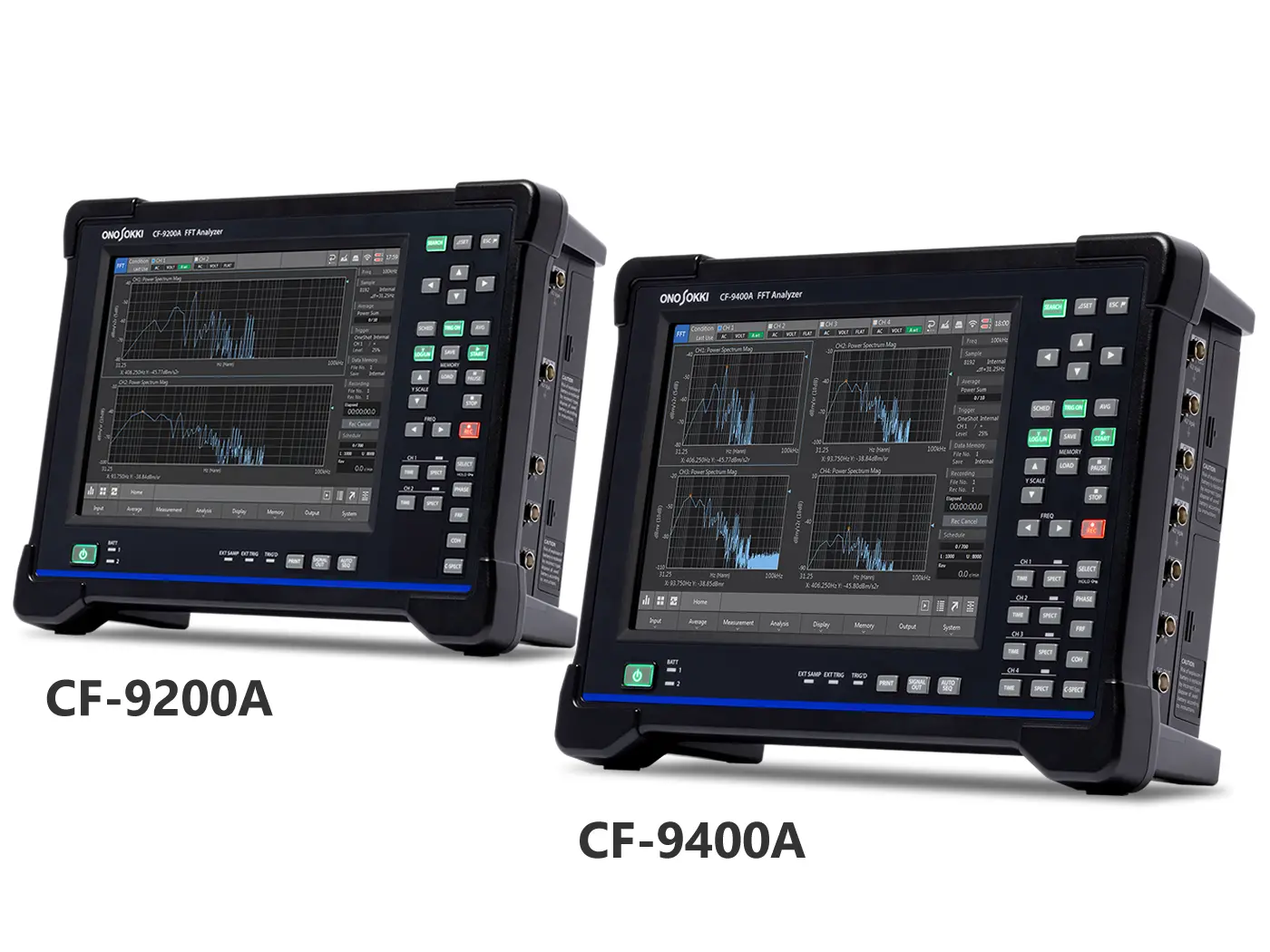
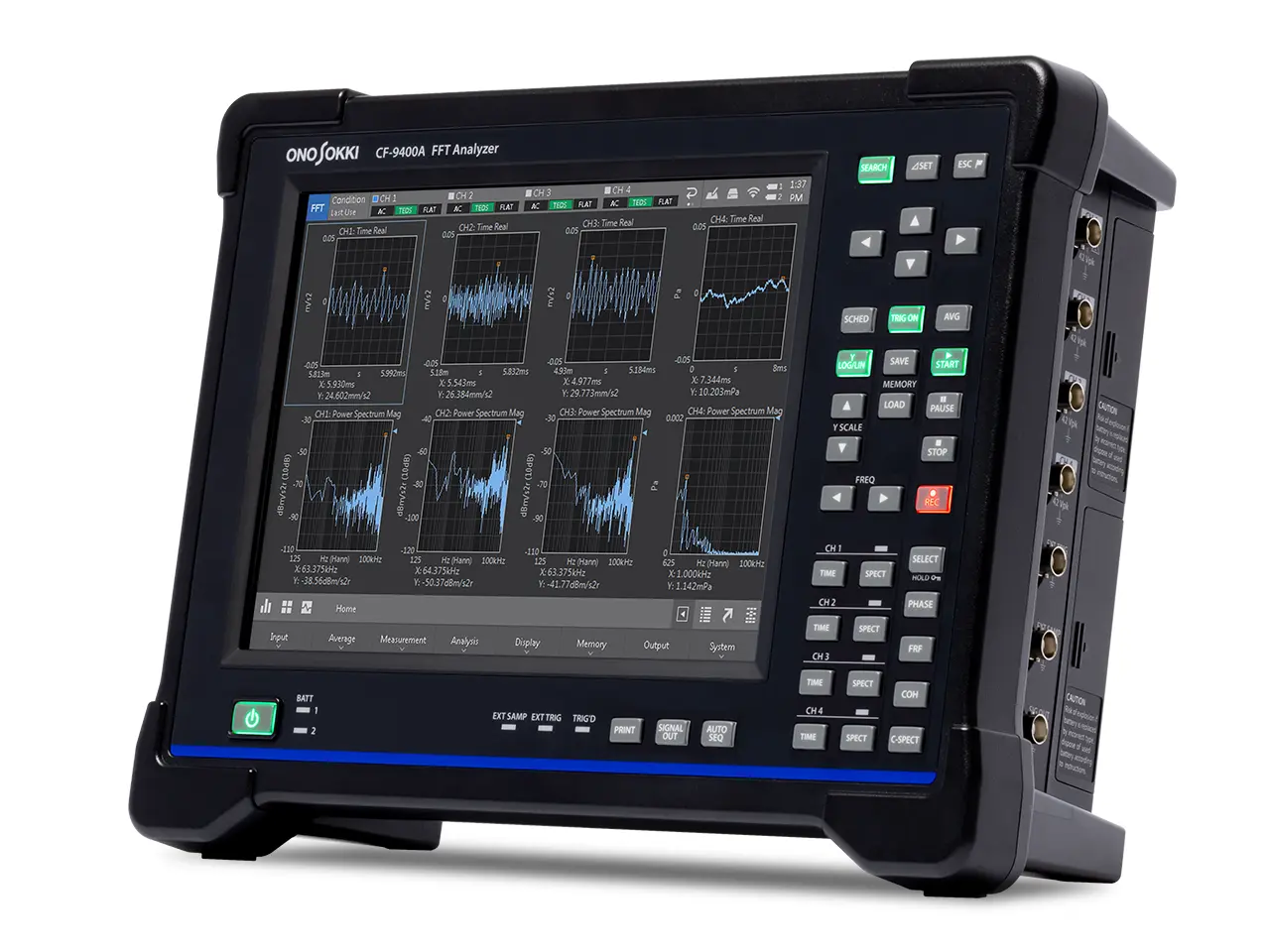
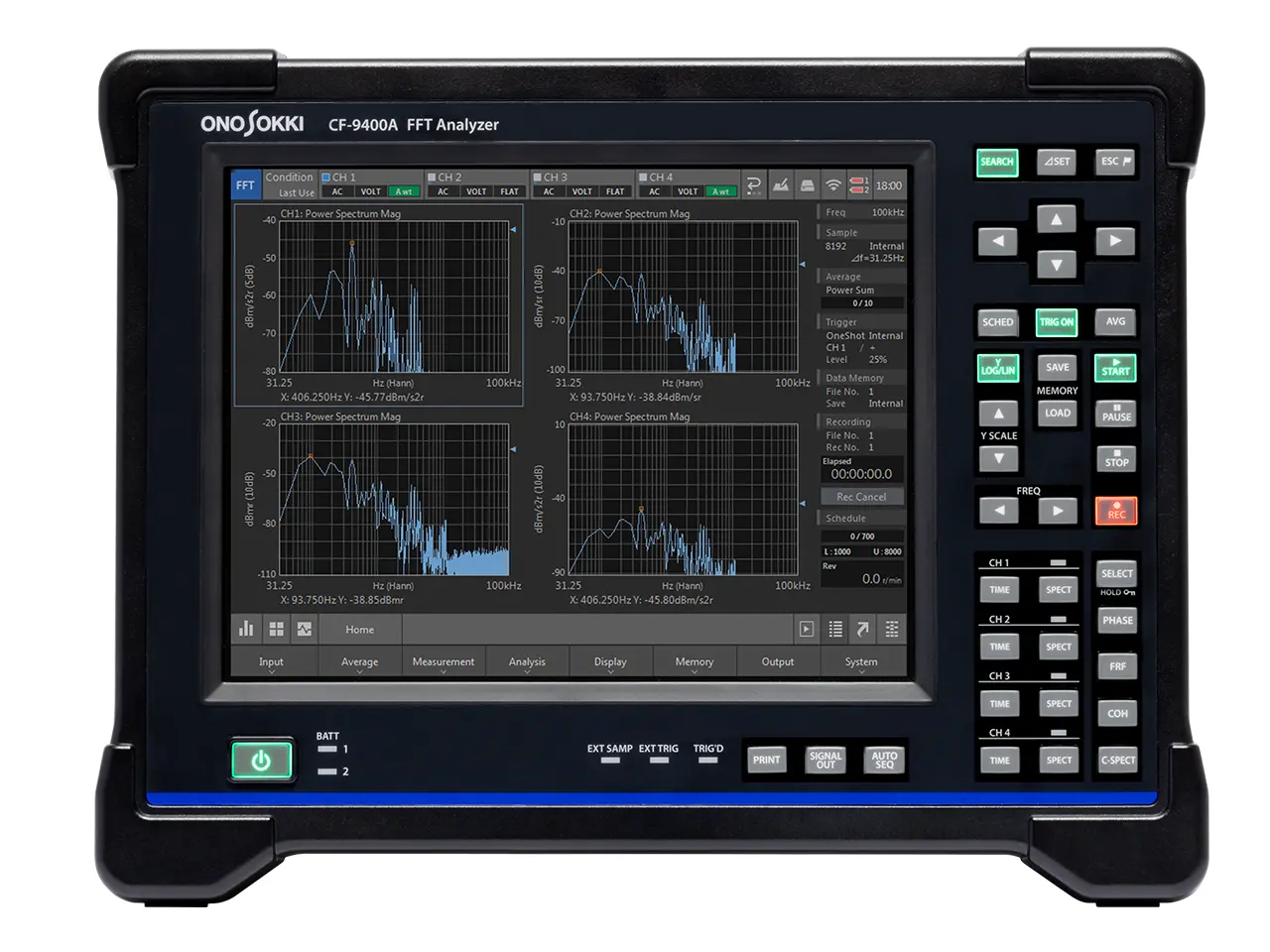
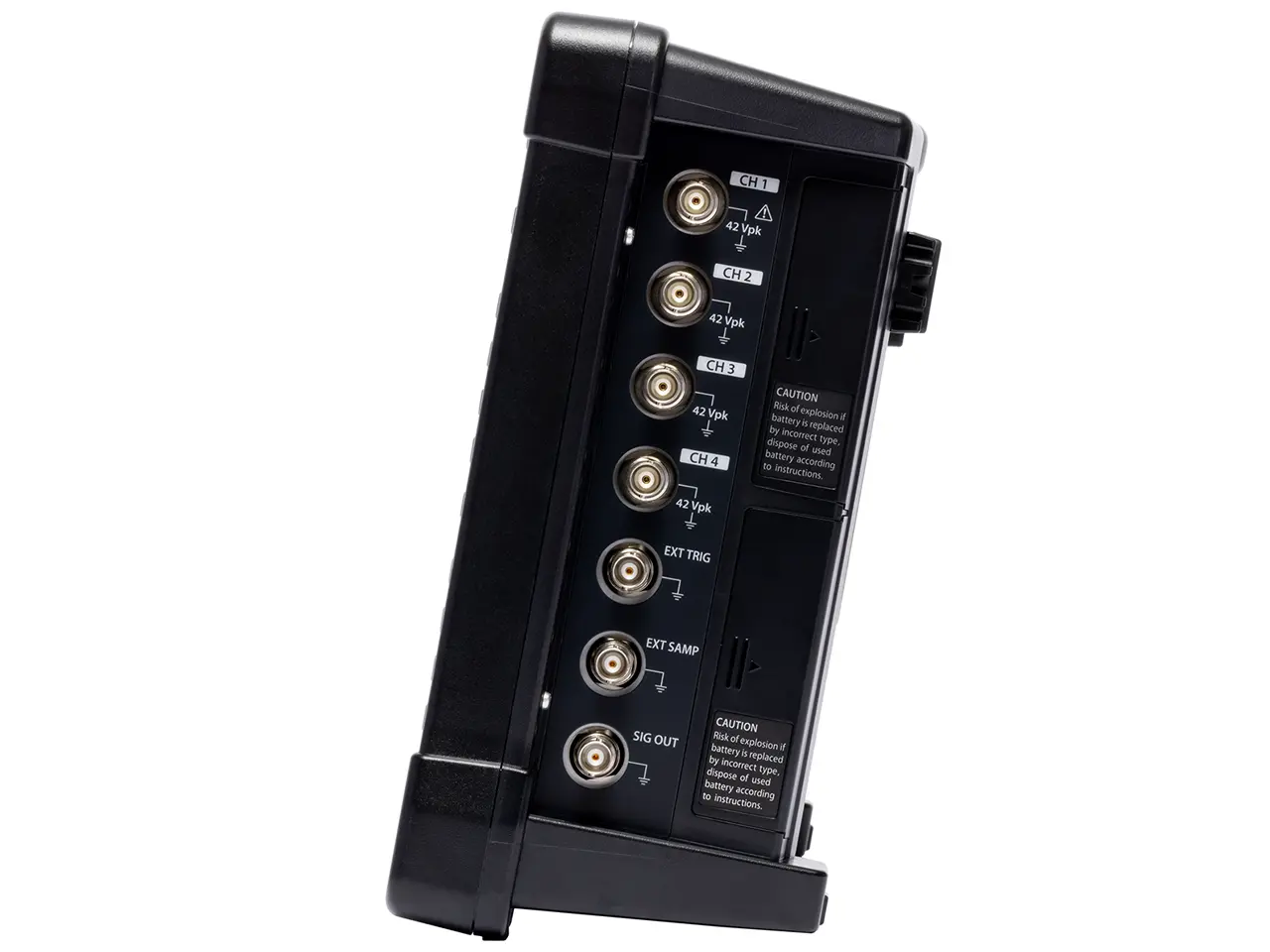
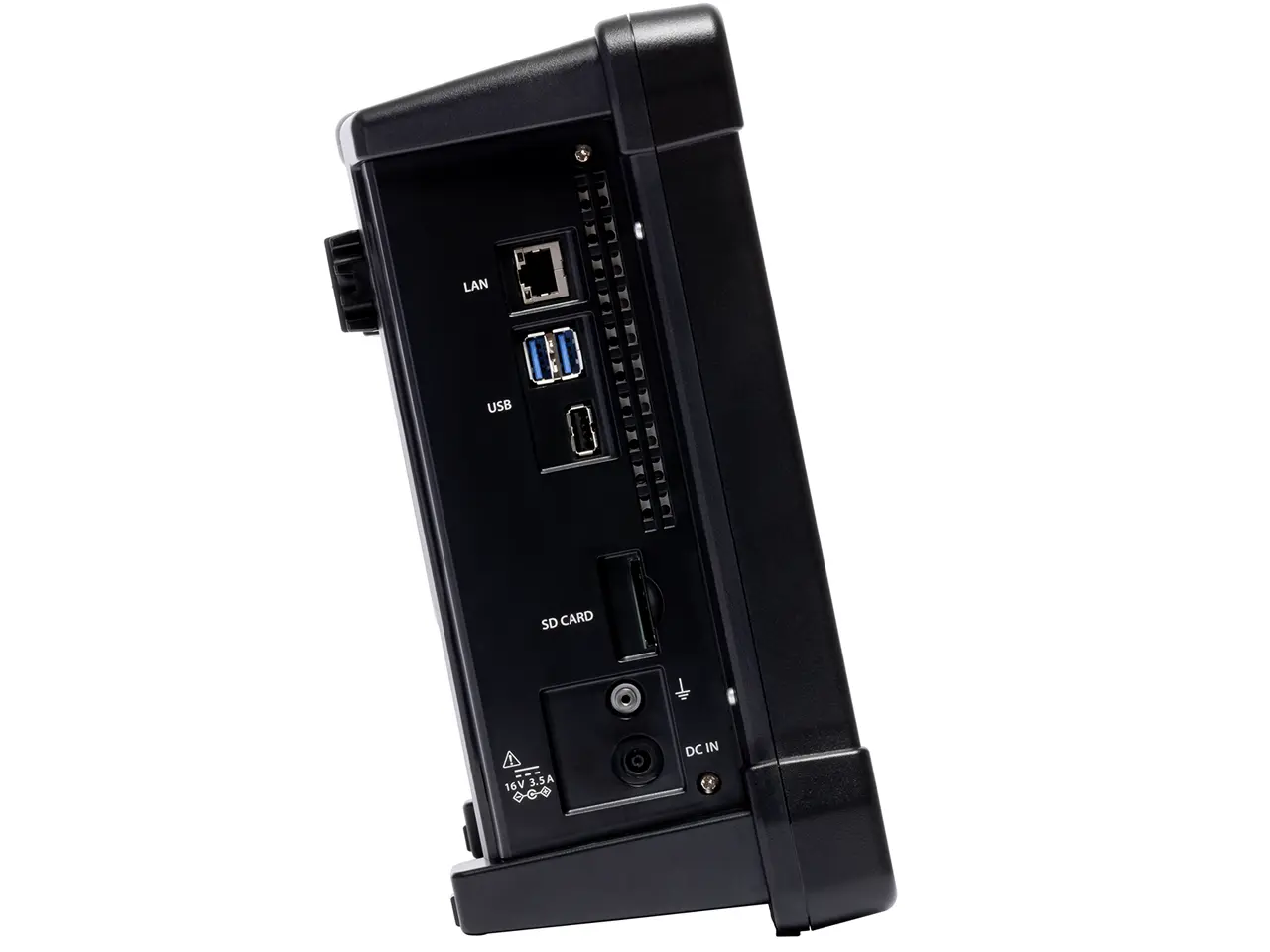
The CF-9200A and CF-9400A are an all-in-one portable FFT analyzers. All FFT analysis operations can be performed with the integrated hard keys and capacitance type touch panel without requiring an external PC for analysis. The new, exclusively developed 100kHz high-performance analysis front-end system incorporating a 24-bit A/D converter enables easier and more reliable analysis of noise and vibration generated by plant lines, pumps, motors, automobiles, railway vehicles, home electrical appliances and devices, and electrical and electronic parts than previous models. The CF-9200A and CF-9400A also offer solutions for field workers in their FFT analysis, including the resonance and frequency characteristics of mechanical structures in a vibrating environment with electromagnetic vibrators and impulse hammers.
Features

With the CF-9000A series, basic FFT analysis operations such as display, measurement, stopping, recording and readout can be made positively and quickly through the large hard keys. The touch panel provides an intuitive interface, allowing the operator to easily perform a range of operations with a swipe or tap, such as selecting the number of waveforms displayed and extending or shortening the X and Y axes to the desired scale.
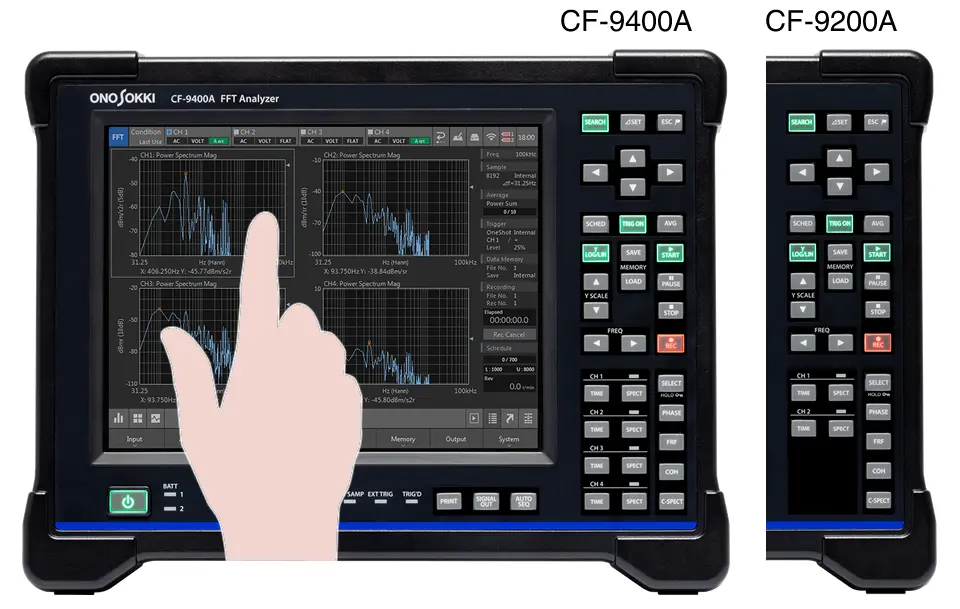

With the CF-9000A series, the two on-board, large-capacity lithium ion secondary batteries enable continuous cordless operation of up to 8 hours*1. The hot-swap function allows the batteries to be replaced while the unit is powered on, enabling the analysis or recording operation to continue while eliminating the need for resetting. The unit can also be recharged while in operation*2, helping to reduce the number of peripherals that would otherwise be needed.
*1 When CF-9400A 4ch CCLD ON.
*2 Full recharge takes 7 or 8 hours depending on operating conditions.
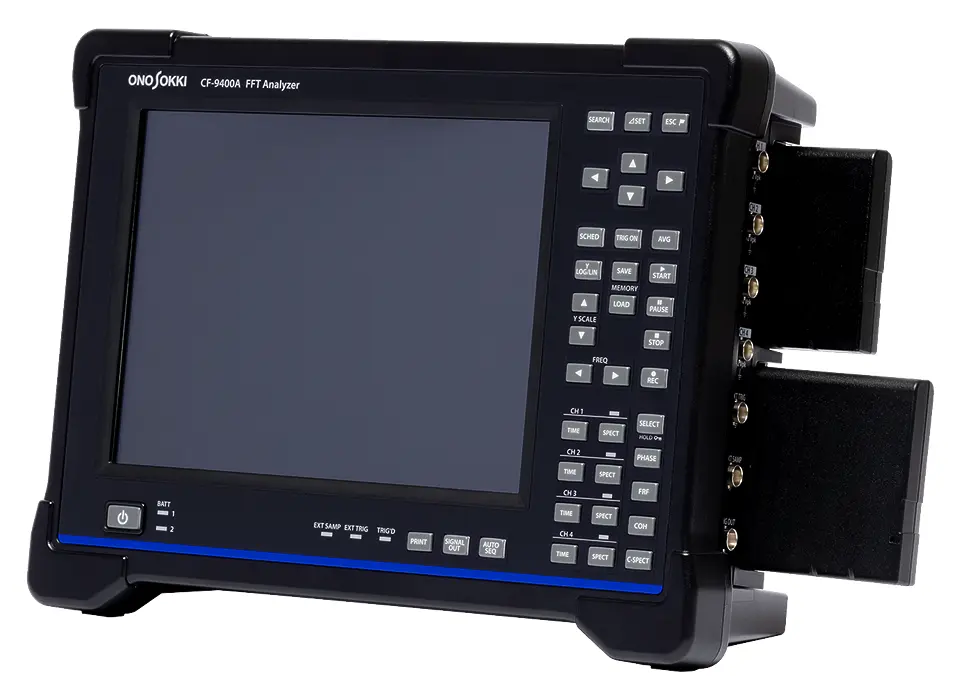

The unit is compact but versatile, capable of carrying out a range of operations from FFT analysis, real-time octave analysis (RTA) *1 and rotation tracking analysis*2, to linear/log sweep analysis using signal output and electromagnetic vibrator control*3. The unit can also perform simultaneous analysis and recording operations, allowing offline analysis back in the office using the CF-9000A main unit and software applications.
*1 Octave analysis software (CF-0923) is required.
*2 Tracking analysis software (CF-0922) is required.
*3 Log sweep/excitation control software (CF-0942) is required.
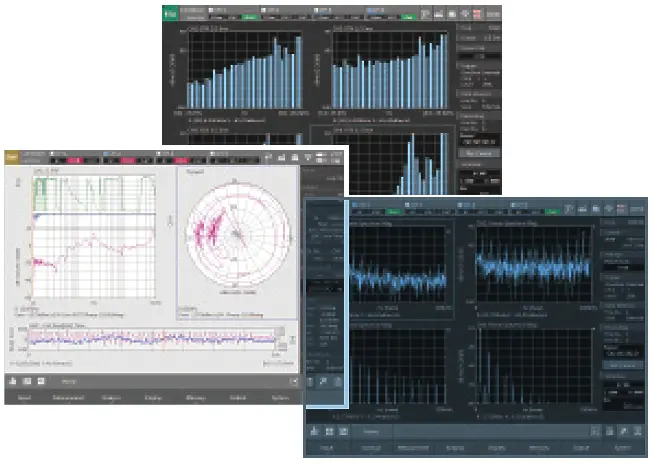

The CF-9000A series offer high performance without fans or spindles. The unit does not produce mechanical operating noise or vibration, and so cannot be a source of noise or vibration in acoustic or vibration measurement/recording locations.
The unit can be operated remotely on a tablet etc. via wireless LAN adapter*. *Using Microsoft® "Remote Desktop."
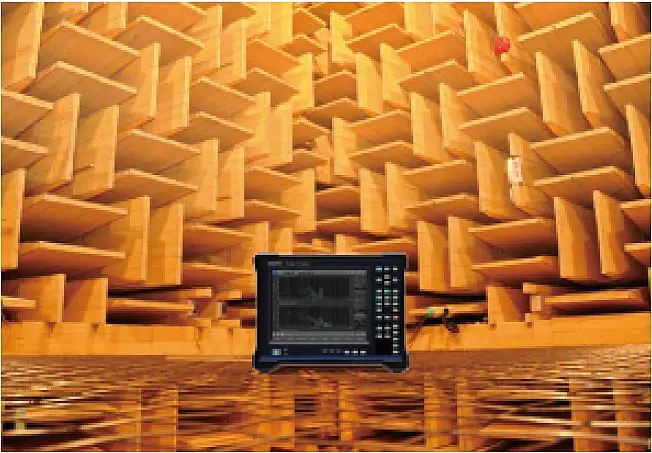
Standard functions
The CF-9200A/CF-9400A comes with a new real-time tripartite graph*1 display function.
During FFT analysis, three amplitude values (acceleration (m/s2) /velocity (m/s) /displacement (m) ) for an arbitrary frequency can be read out in real time. This function will eliminate the need to convert the amplitude by carrying out differentiation and integration individually by the frequency analysis function as with the previous models, thus enabling data at that amplitude to be read speedily.
Displaying VC curves*2 after 1/3 octave processing helps to judge the allowable vibration reference or setting environment evaluation of precision instrument which is sensitive for vibration such as AFM, electronic microscope and laser interferometer.
*1 Amplitude of acceleration (m/s2) and displacement (m) based on the velocity (m/s) on the frequency axis (Hz) can be read by Tripatite graph (image).
*2 VC Curves are proposed as the allowable minute vibration reference of when precision instrument is set. The evaluation by 1/3 octave band width is used in VC Curves. The standard is divided into five stages in increments of 6dB (VC-A, VC-B, VC-C, VC-D, and VC-E) depending on the purpose of use such as optical microscope and laser instrument with long optical path.
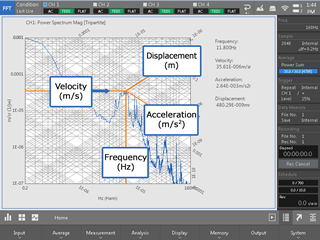
Generic Vibration Criteria for Vibration-Sensitive Equipment, Colin G.Gordon, SPIE99Evolving criteria for research facilities: I-Vibration
The CF-9000A series features a new 24-bit A/D front-end system, offering 120dB wide dynamic range. This eliminates the need for voltage range change in A/D oversampling, which otherwise needs to be frequently performed in acoustic or vibration measurement.
Measuring and data recording do not need to be repeated, making calculation and analysis much more efficient and the FFT analyzer easier to operate even for novices.
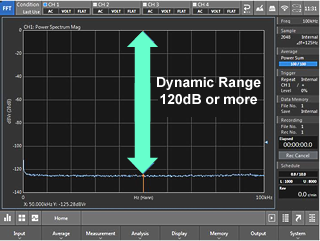
With the CF-9000A series, all signal input channels are isolated (insulated). Highly resistant to ground loops and noise, the unit offers highly reliable measuring performance in locations prone to potential difference.
The isolation scheme also protects the crucial areas of the FFT system from sensors or signals that can be exposed to harmful transient voltages.
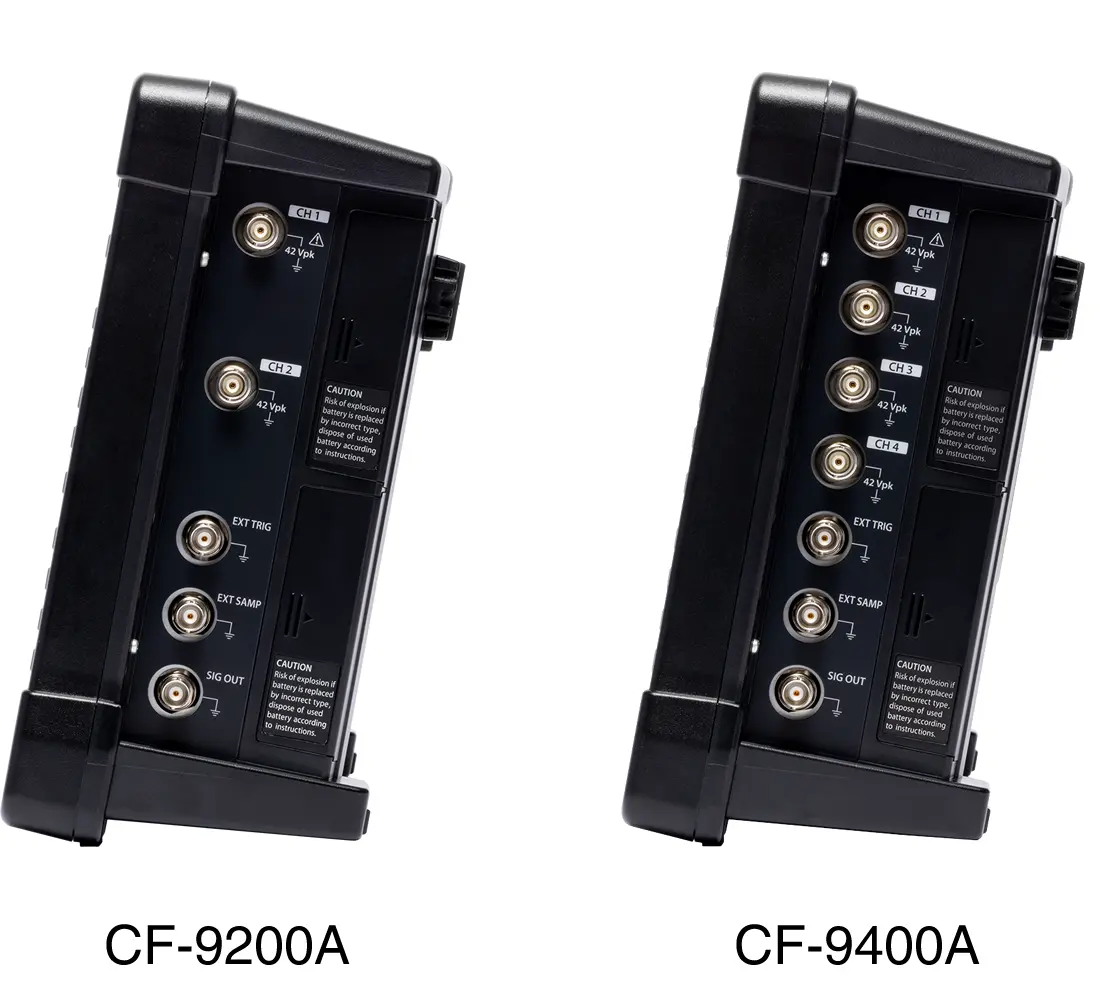
By each input channel with CCLD, an accelerometer with built-in preamplifier, charge convertor for charge output type accelerometer or a microphone can be connected directly to the CF-9200A/CF-9400A. And using TEDS sensor enables power supply and unit calibration to sensor automatically.
*CCLD (Constant Current Line Drive) means the sensor interface using Constant Current Supply. CCLD from an accelerometer with built-in preamplifier or a microphone preamplifier enables direct connection to an FFT Analyzer without using external amplifier. 2 to 4 mA of CCLD is commonly used.
*TEDS (Transducer Electronic Data Sheet) is a general term for the method which contains information relevant to the sensor. It is defined in the IEEE 1451 series. As information of the sensor is automatically read to the TEDS available measurement devices or amplifiers, the user is ready to take measurements. It can avoid setting error and also saves you time and effort of troubling calibration and measurement preparation.
The CF-9000A series employs a 10.4 LCD capacitance type touch panel, allowing the operator to pinch and swipe FFT graphs. The band or gain of your choice can be widened or narrowed with a simple and intuitive action.
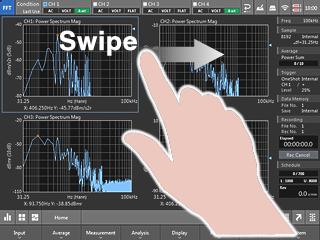
With the CF-9000A series, operations such as turning the power on and off, changing data types and saving data are carried out using the new large hard keys. The positive feel of these keys assists fast and correct input even in unstable or dark sites, helping to prevent failures to save data and malfunctions caused by inadvertent inputs. Lock function (HOLD) for hard keys and touch panel are also effective.
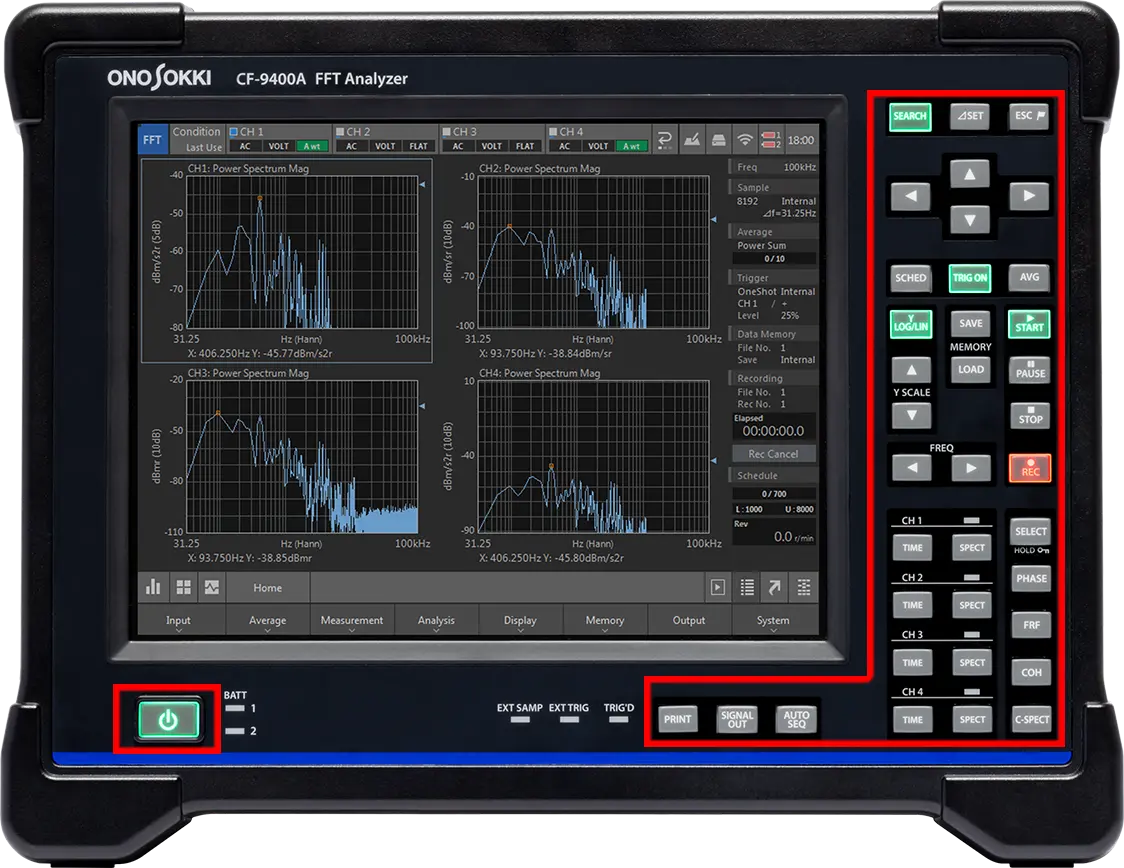
The status of major FFT operations are shown by LED indicators. The hard keys for major functions also have LED indicators. This enables the operator to monitor FFT operations even from a distance, such as the power-up process, the charge status of the secondary batteries and A/D oversampling.
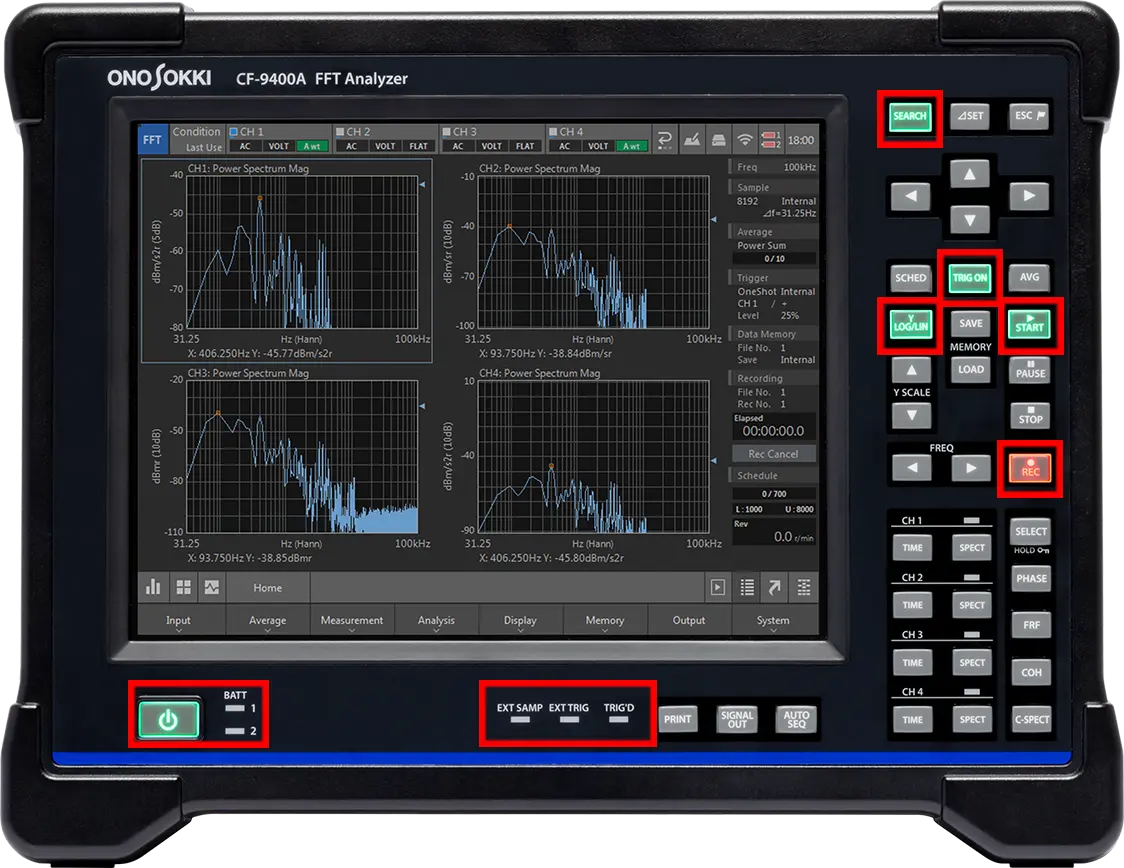
Automatically detects cable disconnection or connector trouble of an accelerometer and a microphone*, preventing trouble before measurement. With the CF-9000A series, this function can be made disable.
*Built-in preamplifier CCLD type
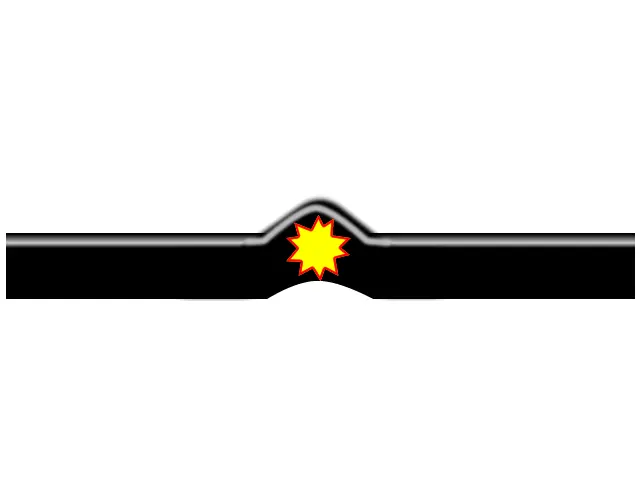
FFT Basic analysis functions
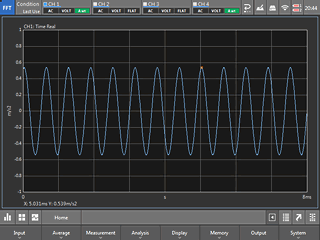
Performs A/D conversion of the raw waveform of an electrical signal of vibration, noise, pressure, strain, etc. coming from a sensor and then displays the result as time-domain data.
The X and Y-axis values at any point can directly be read using the search cursor. The delta cursor function makes it easier to read the time difference and level difference.
The time-axis data analysis function enables quantitative time-axis waveform analysis and diagnosis of such items as mean value (MEAN), root mean squared value (RMS) and crest factor (Crest Factor).
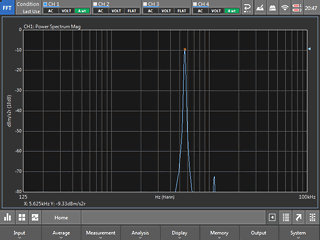
The power spectrum in FFT analysis shows the magnitudes of frequency components of a sampled time-axis waveform, in the form of a graph indicating the power for each frequency band (frequency resolution Δf) on the horizontal axis.
The power spectrum analysis enables detection of abnormal conditions of a facility, which are difficult to estimate through measurement of vibration and noise level and observation of raw time axis waveform. The natural frequency of a structure can also be measured.
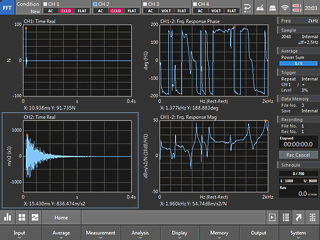
In a mechanical system or an electrical circuit, the input-to-output ratio is shown in gain and phase characteristics with the X axis representing frequency.
The gain characteristics indicate how the amplitude of input signals changes as they pass through the transfer system being evaluated. The ratio of the output amplitude to the input amplitude is plotted on the Y axis in decibels.
The phase characteristics indicate phase advance/delay between the input and output signals with the Y axis plotted in degrees or radians.
Optional analysis software
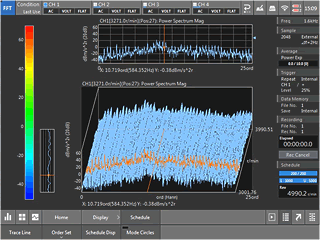
For rotating machines such as engines and motors that have a wide range of operating speed, resonance caused by the natural frequencies of the machine parts and specific operating speeds can be a serious problem.
The tracking analysis software (CF-0922) clearly presents in visual form which speeds of the rotating machine have increased noise and vibration and which parts of the machine are contributing to the problem.
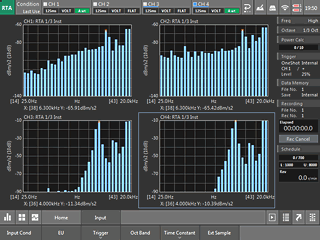
The highest note of an octave has twice the frequency of the octave’s lowest note. As the frequencies of sound increase in geometric progression, the octave analysis software (CF-0923) is an effective tool for noise analysis.
By using 1/1 and 1/3 octave bandpass filters, it is capable of obtaining the sound pressure level of each band of the audible frequency range of the noise being measured.
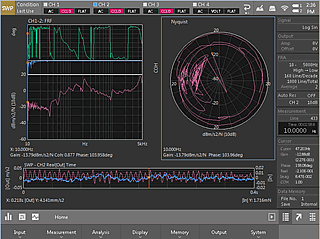
The Log sweep function is used to evaluate the resonance points of a transfer system by continuously changing the frequency of the driving sine waves from a 1ch signal output module (CF-0971).
By sine-sweeping the X axis with a LOG scale, it is possible to obtain the gain and phase for each single frequency and an accurate response function with a high S/N ratio.
The vibration control function limits the amplitude of an electromagnetic vibrator to a desired range, enabling vibration testing without having to consider the frequency characteristics of the vibrator.
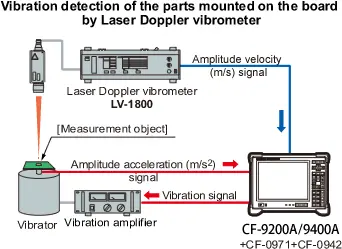
*A 1ch signal output module (CF-0971) is required to use the Log sweep/excitation control function (CF-0942).
System Configurations
Memories & Data Sharing
SSD (Built-in the CF-9200A/CF-9400A)
The SSD (Solid State Drive) incorporated in the main unit of the CF-9000A series can simultaneously run FFT analysis and record time series waveforms that have been converted into digital data by the 24-bit A/D converter. It is also possible to run FFT analysis of recorded data while offline. The results of analyses can be saved in the memory area.
SD/SDHC/SDXC memory card
By using the SD/SDHC memory card, it is capable of storing up to 128 GB (SDXC) of FFT and recorded (ORF) data.
USB memory
The CF-9000A series are compatible with USB memory sticks. FFT data can be saved in a USB memory stick. FFT and recorded data saved in the SSD bult-in the main unit can also be transferred out via the USB facility.
*Not all types of USB memory operation are guaranteed.
Folder sharing on LAN function standard function
FFT measurement data and record data (ORF) saved in the CF-9200A/CF-9400A built-in SSD can be accessed directly from a Windows® PC*. Data extraction and graphing with dedicated software can be performed smoothly. In addition, the data saved on the main unit of CF series can be easily copied and saved on the PC.
*Condition of connecting PC: Windows® 10 (32 bit, 64 bit)
LAN connecting function partially option
By connecting the CF-9200A/CF-9400A to a Windows® PC using a LAN cable, you can copy and write various measurement data, operate from a PC using the remote desktop function*1, and project the screen of CF-9200A/CF-9400A with a projector. In addition, by using the LAN external control function (option, CF-0947), the CF-9200A/CF-9400A can be controlled.
*Condition of connecting PC: Windows® 7 (32-bit, 64-bit), Windows® 10 (32-bit, 64-bit)
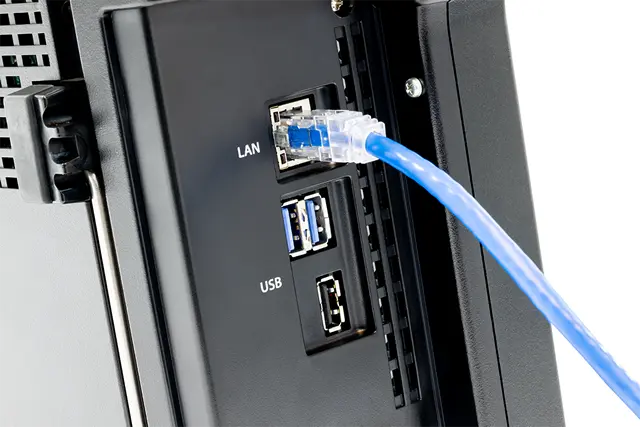
Wireless LAN connecting function option
By attaching a wireless LAN adapter*1 to the main unit of the CF-9000A series, FFT and recorded data saved in the main unit can be transferred wirelessly to a Windows® PC. The remote desktop function*2 allows to display the CF-9000A series unit's various screens or operate the unit remotely on a Windows® PC or other portable information terminals.
*1: Please use the recommended products by Ono Sokki.
*2: Using Microsoft® "Remote Desktop."
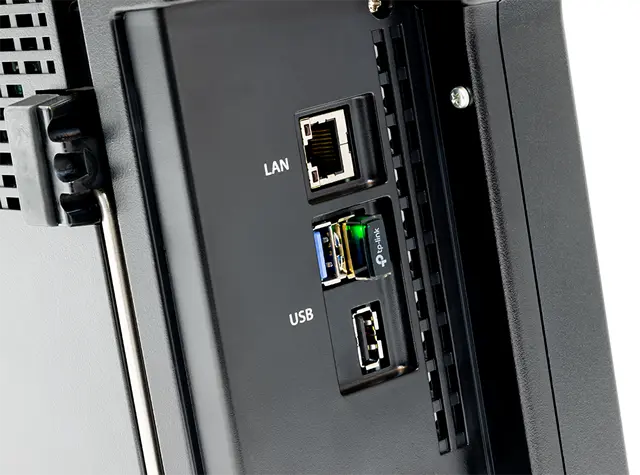
Short-range wireless communication function
By attaching the Bluetooth® adapter made by TP-LINK TECHNOLOGIES CO., LTD. that is Bluetooth qualified product to the main unit of the CF-9000A series, graphs displayed on the current screen can be sent wirelessly to a mobile printer* by simply pressing the PRINT button on the main unit. The function also allows a keyboard to be wirelessly connected to the main unit.
* Please use the recommended products by Ono Sokki.
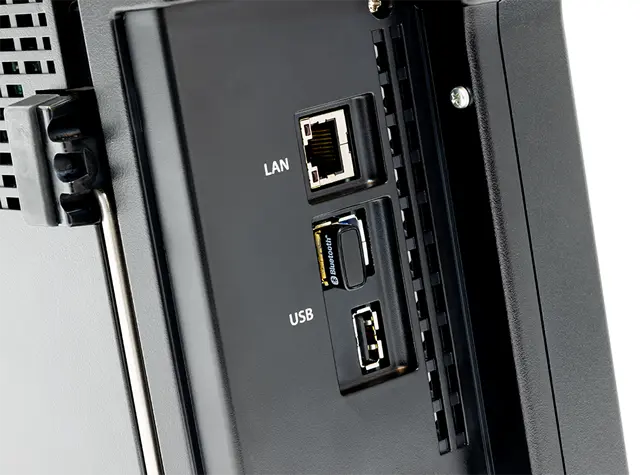
CF-9200A/CF-9400A × O-Solution (software)
The O-Solution software is software series that allow you to import data recorded and saved on the CF-9200A/CF-9400A and smoothly arrange, process, analyze, and graph the data.
Specification
Click to view
1.Input section
2.Display unit
| Size | 10.4-inch |
|---|---|
| Resolution | 800 × 600 dots* |
| Method | TFT color LCD with a capacitance type touch panel |
| Brightness adjustment | 2-level brightness adjustment |
| Back light | LED |
3.Operating section
| Power switch | ON/OFF: Hold the switch for a few seconds. Holding the switch for more than 5 seconds will result in forced power-off. |
|
|---|---|---|
| Operation keys (soft keys) | Detailed settings for each function can be performed by soft keys lower on the LCD display. | |
| Operation keys (direct keys) | Cursor & selector key | Right and left, up and down, SEARCH, ⊿SET, ESC |
| Switches of measurement | SCHED, TRIG ON, AVG, START, STOP etc | |
| Waveform selector | TIME, SPECT, PHASE, FRF, COH, C-SPECT, SELECT | |
| Misoperation preventing function | Hold and press to lock, unlock the soft key & direct key (excluding power switch). |
|
| Printing key | PRINT: Directly prints the displayed screen when connecting a recommended printer | |
| Auto sequence play key | AUTO SEQ: Reproduces the registered continuous operation content | |
| Frequency range selector key | FREQ right and left | |
| Y-axis scale selector | Y SCALE up and down | |
| Signal output ON/OFF | SIGNAL OUT (Available when the CF-0971 option is installed.) |
|
4.Analysis section
| Frequency range | 100 mHz to 100 kHz | |||||||||||||||||
|---|---|---|---|---|---|---|---|---|---|---|---|---|---|---|---|---|---|---|
| Frequency accuracy | ±0.005 % (±50 ppm) of the reading values | |||||||||||||||||
| Sampling frequency | Analysis range x 2.56 (internal sampling) | |||||||||||||||||
| Number of sampling points/analysis points |
|
|||||||||||||||||
| Overlap processing | MAX/66.7%/50%/0%/ optional setup | |||||||||||||||||
| Window function | Rectangular/hanning/flat-top/force/exponential/user-defined | |||||||||||||||||
| Delay function | With reference to channel 1, time frame of other channels can be delayed by 0 to 8191 points | |||||||||||||||||
| FFT real-time rate | First and second order differentials/single and double integrals Absolute value conversion/DC cancel/trend elimination/smoothing | |||||||||||||||||
| FFT real-time rate | 100 kHz/4ch (internal sampling: FFT frame length 2048 points or less) | |||||||||||||||||
| Averaging function | Number of averaging setup | 1 to 65535 times | ||||||||||||||||
| Averaging setup time | 0.1 to 999 seconds, 0.1-second step | |||||||||||||||||
| Averaging can be stopped in terms of times or time. | ||||||||||||||||||
| Time domain | Summation average/exponential average | |||||||||||||||||
| Frequency domain | Summation average/exponential average/peak hold /Subtraction average/sweep average/Fourier average/Max OA | |||||||||||||||||
| Amplitude domain | Summation average | |||||||||||||||||
| A/D-over cancel/Double hammer cancel/Averaging permission select function (ADD+1) /Averaging undo function | ||||||||||||||||||
| Trigger function | Green LED (TRIG'D) blinks when triggered | |||||||||||||||||
| Trigger level | -99 to 99 (unit:%) default=25 % Possible to set threshold value by amplitude unit (including user calibration value) | |||||||||||||||||
| Hysteresis level | 0 to 99 (unit:%) default=2 % | |||||||||||||||||
| Position | ±16383 | |||||||||||||||||
| Mode | Free/Repeat/Single/One-shot | |||||||||||||||||
| Source | CH1/CH2 (CF-9200) to CH3/CH4 (CF-9400) /external trigger input | |||||||||||||||||
| Slope | +/-/ ± (internal trigger) +/- (external trigger) | |||||||||||||||||
| FFT calculation | 32-bit floating point (IEEE single-precision format) | |||||||||||||||||
5.Processing functions
| Time domain | Time-axis waveform/auto-correlation function/cross-correlation function/impulse response/cepstrum |
|---|---|
| Amplitude domain | Amplitude probability density function/amplitude probability distribution function |
| Frequency domain | Power spectrum/Fourier spectrum/Liftered spectrum/Cross spectrum/Frequency response function/Coherence function/Coherence output power |
| Calculation function
(Time-axis statistical processing) |
Mean value/absolute mean value/rms value/standard deviation/maximum value/minimum value/crest factors/kewness/kurtosis |
6.Memory functions
| Recording device | Selectable integrated storage or SD card | |
|---|---|---|
| Recording function | Frequency range | 100 kHz max |
| Recording channel | CH1/CH2: CF-9200A, CH1 to CH4: CF-9400A Rotation information recording is possible. |
|
| Recording time | 4GB: approx. 32 minutes, 50kHz range 4ch recording rotation information OFF, 2048 sampling points | |
| Recording format | ORF | |
| Maximum recording capacity | SD/SDHC/SDXC (Max. SDCX 128 GB) | |
| Data file | 9990 (999 data x 10 bocks) data DAT/TXT/BMP (Data can be saved simultaneously in three formats) | |
| File format | Analysis data can be recorded simultaneously in 3 different formats (TXT/BMP can be selected). DAT/TXT/BMP (List data can be saved when saving in TXT) |
|
| Panel condition memory | Memorizes and recalls measurement conditions (50 types max) | |
| Handwritten memo memory | Hand written memo on the touch panel can be memorized | |
7.Interface
| USB | No. of ports | USB3.0 × 2, USB2.0 × 1 |
|---|---|---|
| USB (Type A) | For USB flash drives (USB3.0 and USB2.0), wireless LAN modules | |
| Wireless connection | Wireless LAN module | made by TP-LINK |
| Bluetooth® adapter | made by TP-LINK | |
| SD | No. of ports | 1 |
| SD/SDHC/SDXC compatible | Capacity: max. SDXC 128 GB* * Not guaranteed all types of SD, SDHC, SDXC card. |
|
| LAN | No. of ports | 1 |
| 10BASE/100BASE-TX/1000BASE-T | External control, Remote desktop | |
| Printer output | Print by PRINT key of the main unit | |
| Interface | USB when attaching the Bluetooth® adapter made by TP-LINK TECHNOLOGIES CO., LTD. | |
| Applicable printer | MW-270 made by Brother Industries, Ltd. | |
| Output data | Screenshot/list display copy | |
8.Other functions
| Condition view | List display of specified conditions |
|---|---|
| Clock | Year, month and date in western calendar Hour, minute and second display |
| Operation sound/alarm sound | Can be specified ON/OFF |
9.General specification
| Power supply | AC adapter or batteries (Both provided as standard) | ||
|---|---|---|---|
| Power consumption | CF-9400 (When CF-0971 signal output option is installed. ) |
87 VA or less (When AC adapter is used, not during battery charging) |
|
| 150 VA or less (AC adapter is used, during battery charging) |
|||
| CF-9200 (When CF-0971 signal output option is installed.) |
73 VA or less (AC adapter is used, not during batter charging) |
||
| 150 VA or less (AC adapter is used, during battery charging) |
|||
| Operating temperature range | 0 to +40 °C (Humidity 20 to 80 %RH, with no condensation) | ||
| Storage temperature range | -10 to +50 °C (Including lithium ion secondary batteries) (Humidity 20 to 80 %RH, with no condensation) |
||
| Functional ground terminal | Ground terminal for denoising | ||
| Outer dimensions | Smaller than 333 (W) ×248 (H) ×112 (D) mm *Not including handle, stand and protruded sections. |
||
| Main unit cooling | Naturally air-cooling (fanless) | ||
| Weight | Without batteries: approx. 3.8 kg | ||
| With two batteries: approx. 4.8 kg | |||
| CE marking | Low Voltage Directive: 2014/35/EU EN61010-1 EMC Directive: 2014/30/EU EN61326-1 RoHS Directive: 2011/65/EU EN IEC 63000 |
||
| Accessories | AC adapter (cable for AC adapter: 2 m) | x 1 | |
| Battery (RRC2020 (100496-15) lithium ion secondary battery) | x 2 | ||
| Instruction manual (CF-9200A/CF-9400A User’s guide book) | x 1 | ||
| CD-ROM (Reference guide, utility, etc.) | x 1 | ||
| SD card | x 1 | ||
10.AC adapter (PS-P20023)
| Input voltage | AC 100 to 240 V |
|---|---|
| Input frequency | 50/60 Hz |
| Output voltage | Rated 16 V |
| Output current | Rated 4 A |
| Safety standard | PSE/CE/UL/GS |
11.Batteries
| Battery | Lithium-ion secondary battery | |
|---|---|---|
| Built in main unit (hot swappable) | ||
| Quantity | Two batteries can be mounted on the main unit. (Detachable) | |
| Drive time | 8 hours (new batteries) 4CH 100 kHz analysis/signal output OFF/LCD backlight (light) USB port is not used. |
|
| Battery status display | Main unit screen | Displays the remaining battery level on the main unit screen when operating on the secondary battery. |
| Battery LED (BATT1, BATT2) | Orange LED is on during charging, green LED is on when full charged. (When connecting AC adapter) |
|
| Red LED is on when LOW BATT (When remaining battery becomes less than 5 % and not using AC adapter) |
||
| When remaining battery becomes less than 15 %, displays a warning message. | ||
| Processing on lower battery remaining level | When remaining battery becomes less than 3 %, displays a warning message and shuts down automatically after saving the data in backup. | |
| Stores the latest panel condition | ||
| Charging time | Analyzer in operation | Approx. 7 or 8 hours (depending on operating conditions) |
| With power OFF | Approx. 7 or 8 hours | |
| External battery charger (recommended product) |
Approx. 4.5 to 5 hours | |
12.Signal output (CF-0971 1CH Signal output module): Option
| Number of channels | 1 | |
|---|---|---|
| Output connector | BNC (C02 type) | |
| Isolation | Non-isolated | |
| Output voltage amplitude | ±1 mV to ±10 V (Amplitude+DC offset) | |
| Output format | Unbalanced output | |
| Output coupling | DC | |
| Protection circuit | Short-circuit protection | |
| Output impedance | 0 Ω or 50 Ω±10 % | |
| Maximum output current | 10 mA | |
| Offset voltage | ±10 V | |
| D/A convertor | 16-bit | |
| Conversion rate | 512 kHz max. | |
| D/A convertor | 16-bit | |
| Output waveform | Sine wave/Swept-sine/Pseudo random/Random/Impulse | |
| THD and spurious | -75 dB or less (at Sine wave 1 kHz, amplitude ±1 V output) | |
| FFT Analysis length | 256 to 16384 | |
| Zoom analysis | Available (relative to zoom analysis range) | |
| Voltage amplitude accuracy | ±0.5 dB or less (at 1 kHz, 1 V0-p, 1 MΩ load) | |
| Frequency accuracy | ±50 ppm | |
| Digital filter | Smoothing filter | The remaining battery level can be displayed on the main unit screen when operating on the secondary battery. |
| Zoom: 6 th ellipse | ||
| Octave band filter | 1/1 or 1/3 octave | |
| 6 th butterworth | ||
| Pink filter | Analog method -3 dB/oct ± 1.0 dB (prescribed for 20 Hz to 20 kHz) | |
| Burst function | Single burst, continuous burst | |
| Burst cycle | Sine wave | 1 to 32767 cycles |
| Swept-sine/ Pseudo random/ impulse | 1 to 32767 FFT frames | |
| Random | 1 ms to 32 s | |
| Cycle setting unit and Burst interval | Sine wave | Sine wave 1 cycle |
| Swept-sine/Pseudo random/ Impulse | 1 FFT frame | |
| Random | 1 ms | |
| Taper function | The output can be gradually increased or decreased when the
signal is turned ON or OFF. 1 ms to 32 s (1ms-steps) *This function is disabled when the burst function is ON. |
|
| Spectrum flatness | 20 kHz to 100 kHz:±1.0 dB or less 0 to 20 kHz:±0.2 dB or less |
|
| Crest factor | Sine wave | Approx. 1.41 |
| Swept-sine | Approx.1.4 to 1.6 | |
| Pseudo random | 3.3 or less | |
| Random | 3.3 or less | |
| Impulse | 32.0 or less | |
Optional software specification
Click to view
Log sweep analysis/Excitation control CF-0942
| Measurement mode (FRA mode) | |
|---|---|
| Measurement frequency range | 10 mHz to 100 kHz |
| Frequency resolution (Log sweep) |
10, 20, 40, 50, 80, 100, 120, 160, 200, 250, 300, 320, 400, 500 lines/decade |
| Frequency resolution (Linear sweep) |
100, 200, 400, 500, 800, 1000, 2000, 2500, 4000, 5000 lines/all band of the measurement frequency range |
| Number of averaging | 1, 2, 3, 4, 5, 6, 7, 8, 9, 10, 20, 25, 30, 40, 50, 60, 80, 100, 120, 150, 180, 200 times and optional number of times |
| Frequency range dividing setup mode | Addition times and signal output level can be changed for each measurement frequency range which is divided (into up to 10). |
| Frequency resolution auto adjusting function | Automatically adjusts the decade of each frequency band and resolution to see the frequency characteristics accurately |
| Frequency resolution increase function | Recalculates the specified frequency range with 20 times to the resolution at the measurement. |
| Calculation function | Frequency axis differential and integral calculus function (1-order differentiation, 2-order differentiation, single integral, double integral), four arithmetic operation |
| Display | |
| Display of Frequency response function | Board diagram (vertical axis : frequency/horizontal axis:gain and phase) |
| Nyquist diagram (vertical axis : real number/horizontal axis:imaginary number) Enables Logarithmic scale display of amplitude | |
| Display mode | FRF
mode (triple screen display) 1) FRF (board diagram), COH (enables ON,OFF of display) 2) Any one of Nyquist or SPEC (1,2ch overlay) 3) TIME, instantaneous spectrum (enables overlay display and specifying channel) |
| List mode (single screen display) 1) Measurement condition 2) List of No./frequency/FRF gain/FRF phase/COH/FRF real number /FRF imaginary number/SPEC1/SPEC2/number of summations for all measurement data |
|
| Peak List
mode (double or triple-screen display) List of frequency, gain and phase on the FRF board diagram display using two ways. 1. Peak point of gain (automatic search) 2. Optionally specified point |
|
| Memory mode 1) FRF of current status data 2) List of saved waveforms 3) Overlay display of waveforms selected from 2) (up to 8 screens) |
|
| Calculation
screen (quad screen display) 1) FRF of current status data 2) FRF of saved data 3) * Waveform of four arithmetic operations and differential and integral calculus of 1),2) 4) * Waveform of open and close loop conversion of 1), 2) 5) Nyquist diagram of calculation result of 3), 4 ) *Waveform of calculation result also can be displayed. |
|
| Display function | Phase
unwrap display Search delta function |
Tracking analysis CF-0922
| Tracking analysis type | Phase Amplitude |
|---|---|
| Sampling method | Constant ratio tracking (external sampling) : Up to maximum
frequency analysis order Constant width tracking (internal sampling) : Frequency range is the same as that of FFT Analysis |
| Number of FFT sampling points | Power spectrum exponential mean Fourier spectrum exponential mean |
| Max. analysis orders | 6.25, 12.5, 25, 50, 100, 200, 400, 800 |
| Max. number of blocks | 1000 (100, 200, 400, 800, 1000) |
| Analysis screen display | 6 screens/list display of tracking available |
| Display function | Time axis waveform, frequency analysis (amplitude, phase), order ratio analysis (amplitude, phase), constant ratio tracking analysis (amplitude, phase), constant width tracking analysis (amplitude, phase), fixed frequency tracking analysis (amplitude, phase), time tracking analysis (amplitude, phase), 3D map, Campbell plot |
| Number of display tracking diagrams | 8 lines (excluding MAX ord, O.A) |
| Schedule function | Rotation schedule (with Automatic judging of decreasing rotation
speed) Time schedule (time trend) |
| Upper and lower limitation setting of rotation times | UP (lower limit → upper limit) DOWN (upper limit → lower limit) UP/DOWN (lower limit → upper limit → lower limit) DOWN/UP (upper limit → lower limit → upper limit) |
| Simultaneous recording & analysis function | Available for constant-width tracking |
Real Time Octave analysis (RTA) CF-0923
| Octave type | 1/1 octave and
1/3 octave (filter : 6 th butterworth) JIS C 1514 : 2002 Class 1, IEC 61260 Ed.1.0 (1995) Class 1ANSI 1ANSI S1.11 : 2004 Class 1 |
|---|---|
| Time weighting (time constant) | 10 ms, 35 ms, 125 ms (FAST) 630 ms, 1 s (SLOW), 8 s, IMPULSE rising 35 ms/falling 1.5 s JIS C 1509-1 : 2005 Class 1, IEC 61672-1 : 2002 Class 1 |
| Analysis frequency range | 0.8 to 20 kHz (1/3 octave), 1 to 16 kHz (1/1 octave) |
| Calculation function | Instantaneous value, maximum value, maximum value hold, and
minimum value hold for every one second. Power averaging value, power summation value, linear Leq |
| Analysis screen display | Up to 6 screens (data overlay display available) List display or real-time octave display |
| Simultaneous recording & analysis function | Available |
| Option | CF-0922 (tracking analysis function) |
LAN external control function CF-0947 (system requirements)
| Client PC (OS) |
Microsoft® Windows® 11 Pro (64 bit) Microsoft® Windows® 11 Enterprise LTSC (64 bit)* Microsoft® Windows® 10 Pro (64 bit) |
|---|---|
| Software | Microsoft® Visual Studio® 2019 (VB, C#) |
| Microsoft® Office Excel® 2016 | |
| .NET | Microsoft® .NET Framework 4 |
| Network cable | LAN cable** Category 6 |
- Microsoft®, Windows® are registered trademarks of Microsoft® corporation in the United States and other countries.
- Windows 11 Enterprise* has been tested and verified to operate correctly in environments using the default configuration (including standard policy settings). We do not guarantee compatibility in environments where default settings have been modified—such as changes to security configurations, group policies, or the use of third-party security software. As a result, support for operation in such customized environments may be limited.
- LAN cable** : The straight cable connection may not be available depending on the system. When using a straight cable, make sure that the system supports Auto MDI/MDI-X.
Option
| Model name | Product name |
|---|---|
| CF-0922 | Tracking Analysis Function (Software option) |
| CF-0923 | RTA Function (Software option) |
| CF-0942 | Log Sweep/Excitation Control Function*1 |
| CF-0947 | LAN external control function (optional software) |
| CF-0971 | 1 ch Signal Output Module*2 |
| CF-0951A | Reference guide (Japanese version) (PDF version is included on the attached CD-ROM) |
| CF-0951AE | Reference guide (English version) (PDF version is included on the attached CD-ROM) |
| CC-0025A | Soft carrying case |
| CC-0091 | Hard carrying case |
| RRC2020*3 (100496-15) |
Batteries (2 included at time of purchase) |
| PS-P20025A | Battery charger set (AC power cable is required separately) |
*1 CF-0971 is required.
*2 The additional fee is required when adding after delivery of the main unit.
*3 For the CF-9200A/CF-9400A. They cannot be used for the CF-9200/CF-9400 (without A).
Recommended product
Related information
Revised: 2025/10/20


